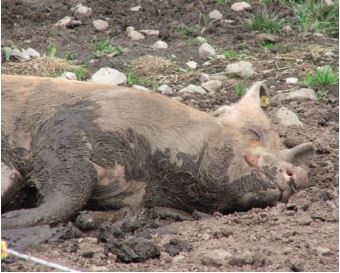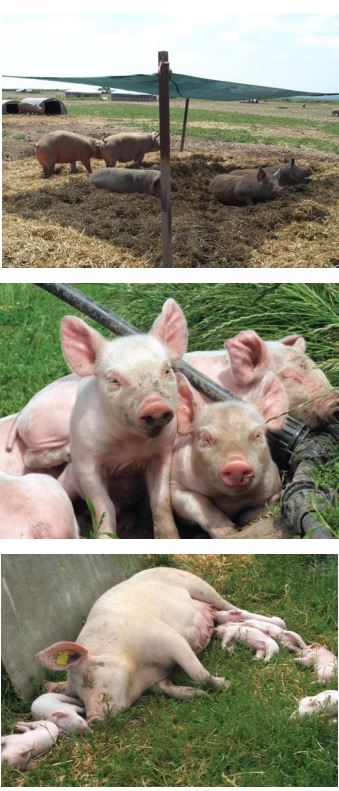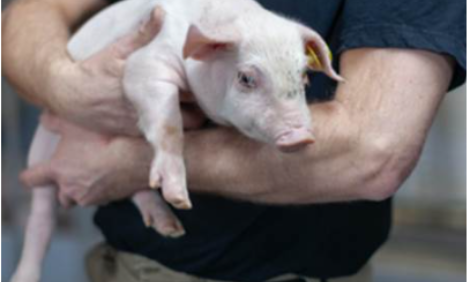



How to Prevent Heat Stress in Outdoor Pig Herds
Heat stress is caused when a pig's body temperature rises above certain limits, and is a particular problem for outdoor-reared pigs, so what can producers do to help their animals stay cool?If a pig is suffering from heat stress, it will first increase its respiration rate in an attempt to keep cool, then search for environmental opportunities for cooling, i.e. wallowing, soiling the pen and lying in urine.
If the pig cannot cool itself sufficiently it will collapse and, in the worst scenario, die.
Heat stress must be avoided in order to prevent unnecessary suffering and reduced productivity; pigs subjected to high temperatures will have reduced growth rates (by up to 50 g/d) and in the breeding herd farrowing rates could decline by as much as 25 per cent, with litter size showing a small drop as well.
Aim to keep pigs within their thermoneutral zone in order to:
- Maintain fertility throughout the year
- Maintain high feed intake and growth rates throughout the summer months
General checklist:
Pigs kept outdoors are particularly vulnerable to radiant heat gain and it is important that they have access to shade in sunny weather. There are a number of ways in which producers can minimising heat stress.
Wallows
Wallowing and rooting in the cool earth are the two primary methods used by pigs to cool down, as heat is lost through the evaporation of water from the skin. It is important that the wallows are muddy, as the layer of mud on the body can reduce sunburn.
For the most part of the year wallows will require only minimal management; however during the warmer months effective wallow management is crucial to ensure that they do not dry up.
Wallow management
- Provide enough space for twice the number of pigs it is intended for; this will enable the more submissive animals to use the wallow.
- Dig wallows early in the year to ensure that you are prepared. Consider hiring a digger to save time and effort.
- Wallows should be more liquid than mud; the consistency should resemble emulsion paint.
- During periods of little/no rainfall replenish with water daily to prevent wallows from drying out.
- Do not allow wallows to become stagnant as this can lead to infections. Provide a separate supply of clean water for drinking in addition to the wallow.
Shade
Sunburn is common in early summer (May/June), as pigs are exposed to the first strong sunlight since winter. Severe sunburn, when the skin blisters, can cause pregnancy failure, and the pain and discomfort will lead to increased stress levels.
Although a layer of mud will reduce sunburn, it is essential to provide shade for the animals so that they can move out of direct sunlight. Ensure that a dry, clean bed of straw is provided in the shade,which will encourage the pigs to lie in these areas.
Accommodation
It is essential that recently farrowed sows are encouraged to lie in their arcs to ensure that piglets are able to suckle. However internal arc temperatures will always be higher than the external temperatures due to the extra heat produced by the sow and piglets.
- Ensure arcs are well insulated.
- Take advantage of the prevailing winds - position the arcs so that they face into the wind.
- Open back vents to improve ventilation.
- Consider painting the arcs white to reflect sunlight.
- Draughts should be eliminated as at ground level they can still cause problems.
Breeding herd
Sows
- Where possible serve at either end of the day when it will be cooler and ensure that holding areas are shaded.
- Maintain good hygiene, especially where sows have been wallowing, and ensure vulvas are clean pre-insemination. Have hand-washing facilities and/or gloves readily available.
Boars
- Heat stress tends to reduce the libido of boars and can reduce the viability of semen for up to 8 weeks post heat stress.
- Record periods of hot weather on your calendar and remember to check semen quality for up to 8 weeks after the last period of heat stress or ill health.
- Boars will not work in hot conditions and encouraging them to do so is likely to increase heat stress. Carry out all DIY at either end of the day
Temperature control of AI doses is crucial as they can overheat quickly and become unviable. Ensure that doses are kept in an insulated container (16–18°C) until required for insemination and that they are shielded from direct sunlight.










